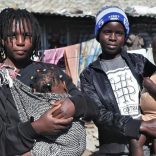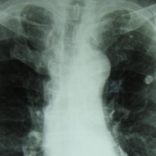Mozambique: Unplanned children don't stop girls' dreams
Mozambique: Health Ministry opposes “disinfection passages” – AIM report

Photo: Rádio Moçambique
Mozambican Health Minister Armindo Tiago on Friday declared that his ministry is opposed to the use of disinfection passages (also known as disinfection tunnels) in the fight against the coronavirus that causes the Covid-19 respiratory diseases.
People walk through a disinfection passage and receive a spray of chemicals which is supposed to destroy the virus. The passages were first used in China, and some extraordinary claims were made for their effectiveness. Thus in February the Chinese news agency Xinhua claimed that a disinfection passage in Shanghai killed 99 per cent of viruses within 20 seconds.
Several other countries – including India, Malaysia, Argentina, Mexico and Pakistan – also installed the disinfection passages. In Mozambique, companies, religious bodies, municipalities and the ruling Frelimo Party have all donated disinfection passages, often in ceremonies that attained substantial media publicity.
But there are two problems with the disinfection passages. First, they don’t work. And second, they might damage rather than improve the health of the users.
The first Mozambican to sound a warning against the disinfection passages was one of the country’s top public health experts, and a former Health Minister, Helder Martins, who is now a senior figure on the Technical and Scientific Commission advising the government on Covid-19. In a television interview earlier this month, Martins said it made no sense to talk about disinfecting people. Chemicals are used to disinfect objects, not people. Furthermore, inhaling the chemicals used could cause serious damage to the human organism.
Tiago agrees, Speaking in Maputo on Friday, at the Health Ministry’s daily press conference on the Covid-19 crisis, he said that, although the institutions installing the disinfection passages in Mozambique are acting out of the best of motives, the scientific consensus, as expressed by the World Health Organisation (WHO), is that the application of chemicals directly on the human body does not offer any protection against Covid-19.
Tiago added that regulatory bodies in Europe and the United States have reached the same conclusion. “These international authorities are unanimous in considering that the application of a disinfectant spray on the body has no impact on the virus which is found inside the body”, he said. “People who are not already infected will not be protected and those who are infected will continue to transmit the virus, even after walking through the passage”.
Furthermore, there was a serious risk that the disinfection passages “might give people a false sense of security”, leading them to neglect measures that really can prevent infection by the coronavirus.
Tiago added that the chemicals used in the disinfection passages could damage the users’ skin, eyes and respiratory systems.
There were also environmental risks involved in flushing a significant amount of disinfectants into the drainage and sewage systems.
On these grounds, said Tiago, the Scientific and Technical Commission is advising that the use of disinfection passages be abandoned in Mozambique, and that the efforts and good will of those promoting this technology should be “redirected to other forms of intervention that are effective and free of risk”.
Briefing reporters on the current stage of the pandemic in Mozambique, Tiago said that by Friday 7,480 people had been tested for Covid-19, 417 of them in the previous 24 hours. 242 of the samples tested were from Maputo City, 20 from Maputo province, 86 from Tete, 11 from Manica, 23 from Sofala, 33 from Inhambane and two from Gaza.
The great majority of those tested – 415 – were negative. Two people tested positive for Covid-19, both of them Mozambican citizens. One was a woman, in the 35-44 age group, in Maputo city, and the other was a man, of the same age group, in Inhambane city.
Following standard procedure, both cases have been placed in home isolation, and health staff are now tracing their contacts, who will be put into 14 day quarantine.
Asked about people who have defied instructions to go into isolation or quarantine, Tiago said “it’s important that everyone understands that this disease is not just a matter for the Ministry of Health, but is something that all of us should fight against”.
The Ministry’s efforts at contact tracing, he added, take up a great deal of time and money, and it made no sense that these efforts should be wasted because a few people chose to behave irresponsibly.
The best known case of a person breaking isolation was that of a young woman in Inhambane who left her home to stay with a boyfriend in another district. The health authorities tracked her down and compelled her to go into isolation in a district hospital, under police guard.
With the new cases mentioned by Tiago, the number of confirmed cases of Covid-19 in Mozambique now stands at 164. 48 have made a full recovery, and there are 116 active cases. No deaths from Covid-19 have been reported.












Leave a Reply
Be the First to Comment!
You must be logged in to post a comment.
You must be logged in to post a comment.